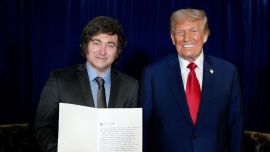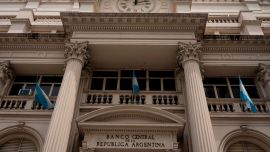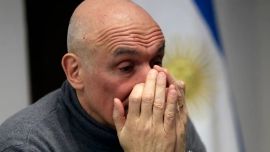Argentina’s football community has been plunged into sadness with the news that popular Boca Juniors coach Miguel Ángel Russo has died at the age of 69.
Russo, a veteran coach who was on medical leave from his post, had seen his health deteriorate in recent weeks. In early September, he was briefly hospitalised at the Fleni Clinic for dehydration, then transferred to the Fleming Institute after developing a urinary infection. He was later discharged for home care.
He had not attended a game for more than two weeks. His last match with the Xeneize was on September 21, when the side drew 2-2 with Central Córdoba in a league fixture at La Bombonera.
In his recent public appearances, he had appeared thin, walked with difficulty and spoke in a faint voice.
Boca Juniors never issued details about his condition, but local media reported that the coach – who was diagnosed with prostate cancer in 2017 – had contracted a urinary tract infection and failed to recover.
On Monday, the club said he was receiving home care under “close medical observation” with a “guarded prognosis.”
In a statement, Boca expressed its “profound sadness” at Russo’s death.
“Miguel leaves an indelible mark on our club and will always be an example of joy, warmth and dedication,” it said. “Farewell, dear Miguel!”
In his absence, assistant manager Claudio Úbeda had been leading the team. Russo’s body will lie in state on Thursday in the hall of La Bombonera for fans wishing to pay their respects, a club source said.
“It was coming, but it’s still sad,” said Boca fan Ignacio Perotti, 40. “He’s the last great coach we had – one of the legends.”
Football institutions across Argentina and South America expressed sorrow over his death, including River Plate, Boca’s historic rival, which praised his “distinguished career as both player and coach.”
Argentina’s national team, currently in the United States for October friendlies, held a minute’s silence in his honour before training on Wednesday.
Local football authorities postponed Boca’s weekend league match against Barracas Central, originally scheduled for Saturday, to a later date.
Veteran
A straight-talking man of few words, Russo spent more than half his life as a coach.
He completed 36 seasons on the touchline, with his most memorable spells at Boca, Rosario Central and Estudiantes de La Plata. At one stage, he was even tipped as a potential manager for the national side.
The first half of his life was defined by his career at Estudiantes, where he played from 1975 to 1988 and celebrated two titles – the 1982 Metropolitano and 1983 Nacional championships.
During that period, he was part of one of the most memorable midfields in Argentine football, alongside Alejandro Sabella, Marcelo Trobbiani and José Daniel ‘Bocha’ Ponce.
The La Plata club paid tribute to him on social media as a “prodigal son and footballing legend.”
His performances earned him a place in the national squad, but he was not selected for the 1986 World Cup, in which Diego Maradona famously captained Argentina to victory.
Years later, Russo admitted he had been angry at being left out, but said iconic coach Carlos Bilardo told him: “The day you become a coach, you’ll understand, like never before.” Russo later said he did.
After retiring as a player, he began a managerial career that saw him take charge of more than 1,000 matches across Argentina, Chile, Spain, Mexico, Colombia, Peru, Paraguay and Saudi Arabia.
Versatile
Russo’s trophy cabinet was not packed, but his successes were often deeply meaningful.
After leading Lanús to two promotions, he returned in 1994 to his beloved Estudiantes, guiding them back to the top flight a year later with a squad featuring rising stars Juan Sebastián Verón and Martín Palermo.
His first first-division title came with Vélez Sarsfield in 2005. Later, at Maradona’s request, he was called on to manage Boca, leading them to victory in the 2007 Copa Libertadores – the pinnacle of his coaching career.
He sealed an enduring love affair with Rosario Central – a club he twice saved from relegation – by winning the Copa de la Liga in December 2023.
In 2017, he led Colombian side Millonarios to a league title just one day after undergoing chemotherapy, earning undying affection in Bogotá.
Throughout his career, Russo was known as a versatile coach who valued tactical balance and discipline. He showed remarkable adaptability, always making the best of the resources at his disposal.
His final chapter began in June, when he accepted Juan Román Riquelme’s offer to return for a third spell at Boca.
After a difficult start, including an early elimination from the FIFA Club World Cup and a poor opening to the Clausura, the side had begun to recover form – until Russo’s health worsened and he could no longer continue.
In one of his final interviews with the La Nación newspaper, Russo reflected on his illness: “Cancer taught me that each day is unique... It’s a blessing to watch others grow. One morning I’ll just say, ‘That’s as far as I go.’”
He is survived by three children, including Ignacio, who followed in his footsteps as a professional footballer.
– TIMES/NA/AFP
























Comments